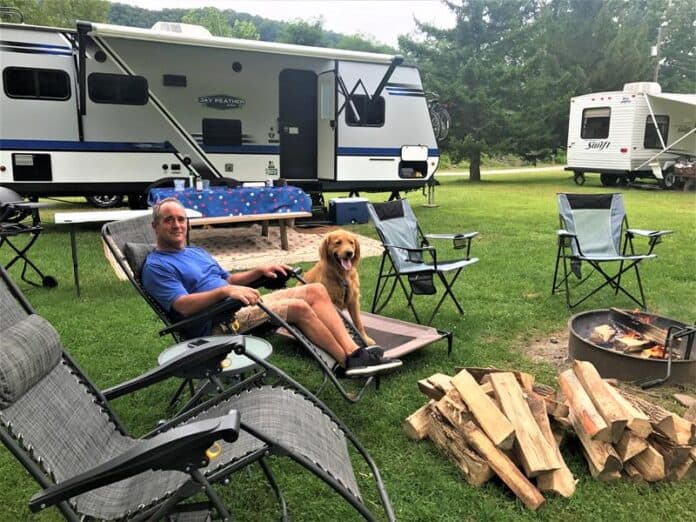When hitting the open road in an RV, the campground you choose can make or break your trip. After years of exploring the great outdoors, I’ve learned that selecting the right campground is more than finding a place to park for the night. It’s about enhancing the entire travel experience, ensuring each stop adds something special to your journey. I recommend the following essential steps and considerations from my personal experience to help you choose the perfect RV campground for your adventure:
Define Your Camping Style and Preferences
Understand Your Needs
Before diving into campground options, knowing what you’re looking for in a camping experience is essential. Do you prefer a full hookup with water, electricity, and sewer access? Or are you more into partial hookups or dry camping, where you might rely on your RV’s onboard resources? Each type of camping offers a different experience. Full hookups provide all the conveniences of home and are great for more extended stays or if you have a larger RV with multiple occupants. Partial hookups might include water and electricity or only a dump station nearby, which is fine for shorter stays or if you’re trying to cut costs.
Dry camping, also known as boondocking, is another option many RVers enjoy. It typically involves staying in remote locations without any amenities. I’ve done my fair share of boondocking, and while it’s thrilling to be entirely off the grid, it requires careful planning, especially regarding water usage, power, and waste management. Understanding these preferences upfront saves a lot of hassle and helps narrow your campground options significantly.
Determine the Desired Atmosphere

The vibe of the RV campground is crucial. Some campgrounds cater to families with plenty of kid-friendly amenities, while others are adults-only, offering a quieter environment. Personally, I’ve stayed in both types and can attest that choosing based on the atmosphere you’re comfortable with makes a significant difference in your overall enjoyment. A remote campground might be perfect if you’re looking for peace and solitude. These places often have fewer amenities but make up for it with stunning natural surroundings and tranquility.
On the other hand, if socializing and activities are more your style, you might prefer a bustling campground with organized events, pools, game rooms, and other facilities designed to keep guests entertained. From my travels, I’ve found that having a clear idea of the atmosphere I’m looking for helps me avoid unpleasant surprises and ensures I get the most out of my campground stay.
Consider Location and Accessibility
Proximity to Attractions and Activities
Location is vital, especially if you have specific plans for your trip. Being close to the activities or attractions you want to explore can save you time and driving. If you want to explore a national park, staying within or near the park is ideal. I’ve had several trips where being just minutes away from trailheads and scenic viewpoints allowed me to make the most of my days. Similarly, if you’re interested in exploring a nearby town, beach, or lake, choosing a campground close to these attractions can enhance your experience and reduce travel fatigue.

Access to local amenities like grocery stores, gas stations, or repair shops is also essential. Having these facilities nearby is always handy for restocking supplies or dealing with an unexpected RV repair. I’ve found that RV campgrounds near small towns often strike the perfect balance, offering easy access to nature and civilization.
Ease of Access for Your RV
It’s also essential to consider how accessible the campground is for your RV. Narrow, winding roads or low-hanging branches can be a nightmare for larger rigs. One memorable trip comes to mind when I found myself navigating a narrow, unpaved road to a remote campground. It was an adventure, to say the least! Make sure the roads leading to the RV campground are suitable for your RV’s size and that there’s enough space within the campground to maneuver comfortably.
Check the RV campground’s website or call ahead to inquire about road conditions and site accessibility. Some campgrounds are better suited for smaller RVs or campervans, while others can accommodate larger motorhomes and fifth wheels. Knowing this information beforehand helps prevent stressful situations and ensures a smooth arrival.
Evaluate Campground Amenities and Facilities
Essential Amenities
Amenities can significantly impact your stay at an RV campground. Basic amenities like water, electricity, sewer hookups, restrooms, showers, and laundry facilities can make a big difference, especially for extended stays. When planning to stay at an RV campground for more than a few days, having access to these facilities is almost necessary, especially if you want to avoid the hassle of constantly managing water and waste levels. I’ve found that while boondocking or dry camping can be an exciting adventure, having access to essential amenities often makes the experience more comfortable, especially if you’re on the road for an extended period.
Additionally, check for site-specific amenities at each RV campground. Some campgrounds offer pull-through sites, which can be incredibly convenient for larger rigs or those who prefer not to back in. Others may offer premium sites with cable TV hookups, enhanced Wi-Fi, picnic tables, and fire rings. Understanding what’s included in your site fee and what you’ll need to bring or prepare for can make your stay much more enjoyable at any RV campground.
Recreational Facilities
Recreational facilities can be a big draw for those looking to relax and have fun without leaving the RV campground. Pools, playgrounds, sports courts, and other recreational opportunities are great if you’re traveling with family or enjoy having these options available. A campground with various recreational facilities can provide hours of entertainment without needing to leave the grounds. For instance, I’ve stayed at RV campgrounds with fishing ponds, hiking trails, and even mini-golf courses, perfect for days when I want to relax but still stay active.
If you’re traveling with pets, like I often do, pet-friendly amenities such as dog parks or pet-washing stations at the RV campground are invaluable. Some RV campgrounds go the extra mile by offering fenced-in dog areas or even agility courses for your furry friends. Having these amenities can make traveling with pets much more convenient and enjoyable, both for you and your pet.
Noise and Quiet Hours Regulations
Noise levels can significantly impact your experience at an RV campground, especially if you’re seeking tranquility. Many RV campgrounds have quiet hours, during which generators and loud music are prohibited. In my travels, I’ve found that RV campgrounds with strict noise regulations offer a more peaceful stay, which can be a welcome reprieve after a long day on the road.
Be mindful of the RV campground’s noise policies and consider how they align with your plans. If you’re a night owl who enjoys late-night campfires and music, look for RV campgrounds with more relaxed rules. On the other hand, if you’re an early riser or light sleeper, an RV campground with enforced quiet hours will likely be more suitable.
Read Reviews and Seek Recommendations
Online Reviews and Ratings
In today’s digital age, online reviews are a goldmine of information for selecting the right RV campground. Websites like Campendium, RV Park Reviews, and Google can provide valuable insights into other travelers’ experiences. From my experience, I’ve learned to look for patterns in feedback rather than focusing on one-off comments. Consistent complaints or praises can give you a clearer picture of what to expect at a specific RV campground.
When reading reviews, consider the details that matter most to you. For example, if having clean and well-maintained restrooms at the RV campground is a priority, look for reviews that mention these aspects. If you’re interested in the campground’s Wi-Fi quality, seek reviews from people who mention working remotely or streaming while staying there. This targeted approach helps you gather relevant information for your RV campground needs.
Ask Fellow RV Travelers
Don’t underestimate the value of word-of-mouth recommendations when choosing an RV campground. Joining RV forums and social media groups can connect you with fellow travelers who are more than willing to share their experiences. Over the years, I’ve received some of my best RV campground recommendations from other RVers who have been there and done that.
Engage with the community by asking questions or sharing your own experiences. Many RV enthusiasts are happy to offer tips, advice, and even insider secrets about the best RV campgrounds to stay at. Whether it’s a hidden gem of a campground or advice on which sites have the best views, these personal recommendations can be invaluable when selecting an RV campground.

Check Availability and Make Reservations
Peak Seasons and Advance Booking
RV campgrounds can fill up quickly, especially during peak seasons. Understanding the high season for your destination and booking in advance can ensure you get a spot. I’ve had a few close calls when I waited too long to reserve, only to find my first choice fully booked. Planning, especially for popular RV campgrounds, is always a smart move.
If you’re traveling during a busy time, such as summer holidays or special events, booking as early as possible is wise. Some RV campgrounds allow reservations up to a year in advance, so taking advantage of this can guarantee your spot. For more spontaneous trips, look for RV campgrounds that accept same-day reservations or have a first-come, first-served policy.
Cancellation and Refund Policies
Life on the road can be unpredictable, and plans can change. That’s why it’s essential to understand the RV campground’s cancellation and refund policies. Some RV campgrounds are more flexible than others, which can help if your travel itinerary shifts. I’ve had to make last-minute changes more than once, and choosing RV campgrounds with accommodating policies has been a lifesaver.
Check if the RV campground offers refunds for cancellations or if they only provide credits for future stays. Some RV campgrounds may charge a fee for changes or cancellations, while others offer more generous policies. Understanding these terms can help you make more informed decisions and avoid unnecessary costs.
Consider the Cost and Value for Money
Compare Pricing with Amenities and Location
The cost of staying at an RV campground can vary widely, and it’s essential to understand what you’re getting for your money. Better amenities or a prime location might justify a higher price. I’ve stayed at RV campgrounds where the extra cost was well worth it for the convenience and comfort, while at other times, a budget-friendly option was just as satisfying.
When comparing prices, consider what’s included in the nightly rate at each RV campground. Does the campground offer free Wi-Fi, firewood, or access to recreational facilities? Are there any additional pet fees, extra vehicles, or premium sites? Understanding these factors can help you determine the best value for your money and avoid any unexpected charges at the RV campground.
Look for Discounts and Memberships
If you know where to look, there are many ways to save on RV campground fees. Camping clubs like Good Sam, KOA, or Passport America offer discounts that can add up over time. Additionally, some RV campgrounds offer discounts for seniors, military personnel, or AAA members. From personal experience, taking advantage of these savings can make a big difference, especially on a long trip.
If you plan on staying at multiple RV campgrounds within the same network, consider purchasing a membership or loyalty program. These programs often provide discounts, special offers, and other perks to enhance your camping experience and save you money in the long run.
Inspect the Campground Upon Arrival
Check for Safety and Cleanliness
Once you arrive at the RV campground, look around to ensure it meets your expectations. Check that facilities are well-maintained and that safety measures are in place. A clean, orderly RV campground is often a sign of good management and can enhance your stay. Upon arrival, I always take a moment to assess these factors; knowing I’m staying in a safe environment gives me peace of mind.
Look for well-maintained restrooms, clean campsites, and adequately marked emergency exits. If you notice any safety hazards, such as exposed wires or broken equipment, immediately inform the RV campground staff. A little vigilance can go a long way in ensuring a safe and enjoyable stay.
Evaluate Site Suitability
Finally, ensure that your assigned site at the RV campground is suitable for your RV. Make sure it’s level and that there’s enough space for your rig and any additional vehicles. Proximity to amenities and the overall layout of the RV campground can also impact your experience. A little effort at the start can save a lot of frustration later on.
If you’re unhappy with your site or have concerns, please get in touch with the RV campground staff. They may be able to move you to a more suitable spot or address any issues you’re experiencing. In my experience, most RV campgrounds are willing to accommodate reasonable requests, especially if it means improving your stay.
Conclusion
Choosing the right RV campground involves more than just picking a spot on the map. It’s about finding a place that suits your needs and enhances your travel experience. From understanding your camping style to evaluating amenities, rules, and costs, each step plays a crucial role in ensuring a pleasant stay at an RV campground. Based on my years of RV travel, I encourage you to take your time and consider all these factors. A well-chosen RV campground can turn a good trip into a great one, making your adventures on the road all the more memorable.
FAQs
What is the difference between an RV park and a campground?
An RV park is a specialized campground that caters specifically to recreational vehicles, while a campground is a more general term that can include sites for tents, cabins, and RVs.
Why is RV camping so expensive?
RV camping is expensive due to the high costs associated with RV ownership, maintenance, and campground fees.















